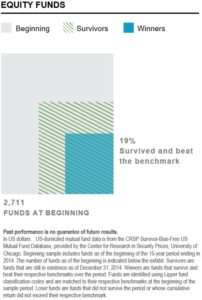A keen intellect and extensive experience are valuable traits for an investment manager to possess. Unfortunately, they are not sufficient to allow them to produce market beating returns. This reality goes against our intuition, and it’s this intuition that allows mutual funds to charge exorbitant fees to hopeful investors.
In Parts 1 and 2 of this series, I discussed how markets work and concluded that beating the market is difficult due to heavy competition and costs of active trading. Unfortunately, many people easily accept the logic in those arguments, yet believe that while beating the market may be difficult for the average person, their investment manager is smarter, more talented or more experienced than most.
Fair enough. Let’s look at the track record of US Equity Mutual fund managers over the last 15 years. Keep in mind, the managers of most of these mutual funds hold MBA or PhD degrees from top universities and have many years of experience:

What this graphic depicts is that if you randomly selected one of the 2,711 equity mutual funds in existence in January 2000, you had about a 1 in 5 chance that your fund would still be in existence and beat its benchmark over the next 15 years.
Less than 20% of the top investment professionals produced market-beating results!
Competition
You might be thinking, “How can this be?” If I need my roof fixed I do my research, get some recommendations, and hire the best roofer I can find, confident that they will do a good job. It’s the same process to find a good doctor, lawyer, or accountant.
The most skilled professionals do the best work and get the best results, right?
Well, sort of.
The difference between these other professionals and investment managers is that the other professionals don’t compete with each other to get good results.
Consider the case of a doctor. In order for a doctor to get a good result, she just has to make a correct diagnosis. In most cases, one good doctor’s diagnosis will be the same as another good doctor’s diagnosis.
In contrast, in order for an investment manager to beat the market, she has to correctly value a stock and her peers (i.e. the market) have to be wrong.
Who among us would think it a good bet to pit our doctor’s diagnosis against the diagnoses of thousands of other doctors? Hiring an investment manager that attempts to beat the market is doing essentially the same thing.
Baseball Analogy
A better comparison for investment managers would be a baseball player. Even the best baseball players typically have batting averages below .400. Does this mean they aren’t good at what they do? Of course not.
If I was pitching the ball, a top major league hitter would likely get a base hit virtually every time he stepped up to the plate. The reason even the best hitters only get hits about a 1/3 of the time is that they are competing against equally talented, well-trained pitchers. No matter how good the hitters get at hitting, they’re very unlikely to ever be able to crack .500 over an entire season.
So it is with investing. No matter how smart your manager is, no matter how good she is at understanding markets or evaluating companies, she’s very unlikely to be able to beat the market over the long-run. To beat the market, she has to outwit some of the smartest, most experienced, hardest-working professionals in the world.
Fees
There’s one other reason for such a poor outcome. Even in a zero-sum game like poker, you would expect half the participants to do better than average and a half to do worse. So why do only 20% of mutual funds beat their benchmarks?
One word: fees.
We talked in part 2 about the added expense of trading. Mutual fund managers face these same costs, which some estimate at about 0.5%. In addition, traditional mutual funds charge a management fee typically around 1.0-1.5% annually. So when compared to market benchmarks, mutual funds face close to a 2% hurdle.
In other words, if the market is up 7% one year, managers have to generate a return before fees of about 9% in order to beat the market after fees. These expenses make beating the market truly a difficult proposition, even for the most expert professionals.
Steep Odds
Of course, mutual funds have a huge incentive to try to convince investors that they’re different – that they have the best strategy or the smartest managers. The siren song of high returns is one that will continue to lure investors and generate incredible profits for the mutual fund industry for the foreseeable future.
In my opinion, paying for something you only have a 20% chance of actually receiving doesn’t seem a prudent use of your hard-earned money.
To schedule a complimentary, no-obligation introduction click here.

